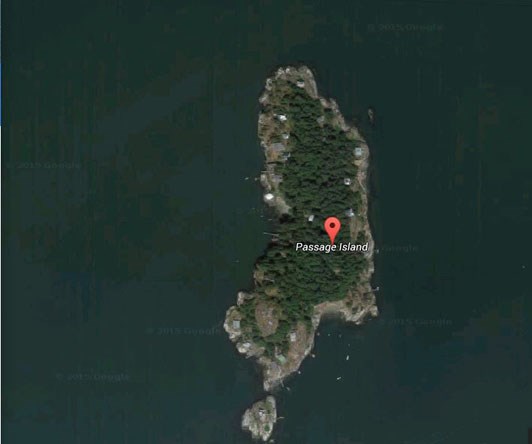No man, and no homeowner, is an island - even if their house is built on one.
A couple who bought a property on Passage Island, about a 15-minute boat ride from West Vancouver, learned that recently after the Greater Vancouver Regional District slapped a notice on title over an illegal five-storey home.
The notice is a legal warning to prospective buyers that the house was built without a building permit and likely doesn't meet the current Building Code.
That warning hadn't been officially spelled out when the couple who now own the lot bought the property. But it's an issue Metro Vancouver officials are hoping to get across to owners of remote properties - both those who unknowingly inherit problems and those who deliberately choose to flout regulations - "to let them know what the rules are and that there are rules," said Maria Harris, representative for the unincorporated electoral area within Metro Vancouver's regional government.
There are only about 30 cabins on Passage Island, most of those seasonally occupied. But living on an island or up a remote inlet is no guarantee that a house can be constructed without paying attention to the rules, or attracting the attention of watchful neighbours or building inspectors.
In the case of the Passage Island home, former owners of the waterfront lot got a building permit to construct a workshop on the land in 1996. But what they built didn't match the plans they had submitted, and an occupancy permit was never granted, according to a Metro Vancouver staff report.
Despite that, over time the workshop "expanded incrementally," according to the staff report, to connect to a separate home that cascades five storeys down the side of a bluff.
"It is unclear what portion of the current dwelling and workshop would meet the minimum standard of the B.C. Building Code; observations of the buildings' exteriors, however, suggest that significant portions of both structures may not be built in accordance with the Building Code," according to the staff report.
Neighbours previously complained about the house in 2000 but no action was taken by inspectors.
Current owners bought the property without realizing there were potential problems.
Most recently a neighbour complained about unsightliness and potential instability of the home, prompting Metro Vancouver inspectors to investigate.
Owners have indicated they are willing to work with staff, said Harris. One hitch is the property does not have a dock, and the couple has only been able to visit by kayak, she said.
But the Passage Island home isn't the only North Shore property to come under the inspectors' microscope.
Another illegally built water-access property at Johnson Bay - about 20 minutes up Indian Arm from Deep Cove - has also been the subject of official concern. In that case, a home was built without a permit on land that was later discovered to encroach on foreshore owned by Port Metro Vancouver.
Owners ignored a stop work order and a court eventually ordered them to get a building permit within six months or take the building down.
More recently, the owners have been attempting to work out a solution with Port Metro Vancouver giving them a long-term lease over the encroachment.
"People build without a permit for a whole variety of reasons," said Harris. She added, "if a large expensive house has been built and that house is in a place it cannot remain, that's obviously an enormous expense."
Harris said while such cases don't come before the board at Metro Vancouver very often, there have been three properties where notice was placed on title this fall.
Harris said she's asked that Metro Vancouver staff provide an update on those situations and that more regular communication go out between rural area residents and the regional government.
"I see this as an education piece," she said, "so people aren't caught off guard."



